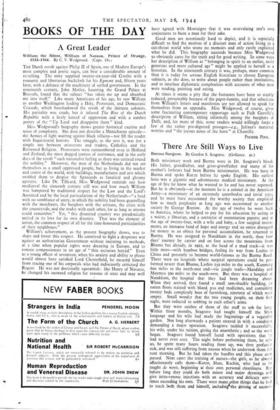BOOKS OF THE DAY
A Great Leader
THE Dutch revolt against Philip II of Spain, one of Modern Europe's most complex and poetic sagas, can bear a considerable amount of re-telling. The story supplied twenty-six-year-old Goethe with a romantic and libertarian backcloth for his Egmont and, fifteen years later, with a defence of the machinery of settled government. In the nineteenth century, John Motley, haunting the Grand Palace at Brussels, found that the subject " has taken me up and absorbed me into itself." Like many Americans of his age, he saw William as another Washington leading a Holy, Protestant, and Democratic Crusade, which foreshadowed the revolt of the thirteen colonies. His partiality was crude, but it infused The Rise of the Dutch Republic with a lively hatred of oppression and with a sombre poetry of the " Up Lord and disappoint them " kind.
Miss Wedgwood's biography shows greater historical caution and sense of complexity. She does not describe a Manichaean episode— the Armies of light warring against black villainy—nor fill the reader with Inquisitorial horrors. The struggle, as she sees it, was not a simple one between aristocrats and traders, Catholics and the Reformed Religion.. Protestants were outnumbered even in Holland and Zealand, the most dogged centres of resistance, and in the early days of the revolt " such nationalist feeling as there was centred round the nobility." Moreover, the men of the Netherlands did not see themselves as a small oppressed people, but as living in the market and centre of the world, with buildings, manufactures and arts Which enabled them to despise the Spaniards as fanatical and gloomy upstarts. Like Dr. Tillyard, Miss Wedgwood reminds one how mediaeval the sixteenth century still was and how much William was hampered by traditional respect for the Law and the Lord's Anointed and by the local particularism of the Netherlands—" a land with no semblance of unity, in which the nobility had been quarrelling with the merchants, the burghers with the artisans, the cities with the countryside, and the trades with each other, for as long as anyone could remember." Yet, " this disunited country was paradoxically united in its love for its own disunity. That was the element of union, the common respect of all for the time-honoured particularities of their neighbours."
William's achievement, as the present biography shows, was to share and foster this respect. He contrived to fight a desperate war against an authoritarian Government without imitating its methods, at a time when popular rights were decaying in Europe, and to remain compassionate in an age of " thin sectarian hatred." Even as a young officer of seventeen, when his anxiety and ability to please would almost have satisfied Lord Chesterfield, he excused himself from tracing one of his corporals who had indiscreetly criticised the Regent. He was not doctrinally squeamish : like Henry of Navarre, he changed his outward religion for reasons 'of state and may well have agreed with Montaigne that it was overvaluing one's own conjectures to burn a man for their sake.
Good men are notoriously hard to depict, and it is especially difficult to find the motives of a discreet man of action living in a cut-throat world who wrote no memoirs and only rarely explained what he did. This biography succeeds because Miss Wedgwood so obviously cares for the truth and for good writing. In some ways her description of William as " belonging in spirit to an earlier, more generous and more cultured age " might be applied to herself as a historian. In the nineteenth century it was, perhaps, more common than it is today for serious English historians to choose European subjects, as she does, to write about people rather than institutions, and to interlace diplomatic complexities with accounts of what men were reading, painting and eating.
At times it seems a pity that the footnotes have been so starkly reduced, presumably because of the paper-famine, and that selections from William's letters and manifestos are not allowed to speak for themselves from an appendix. Miss Wedgwood, of course, gives some fascinating contemporary rapportage such as Fulk Greville's description of William, sitting informally among the burghers of Delft, and, for more of this, some readers would willingly forgo a few of the rather pre-digested passages—e.g., Juliana's maternal worries and " the joyous notes of the horn" at Chantilly.
PHOEBE POOL.


























 Previous page
Previous page